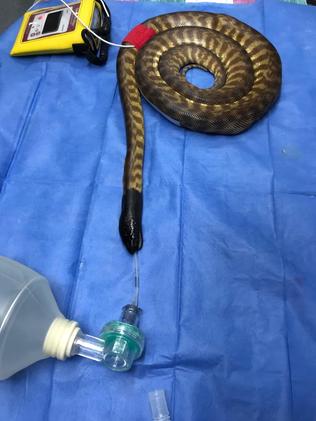Snake season still going strong with fights, worms and pillow cases?
WHEN veterinarian Joshua Llinas was slicing open the snake’s stomach the first thing he saw was a tag attached to a pillow slip. WARNING: GRAPHIC CONTENT
VETERINARIAN Joshua Llinas sliced open the snake’s stomach with steady hands.
The first thing he saw was a tag attached to a pillow slip.
“With the first incision, the actual pillowcase tag was in front of me. It said “standard,” so I knew what size pillow case it was,” he said.

He very slowly pulled out the first half of the now twisted and slimy black pillow case from the anaesthetised, 1.8m black headed python, before carefully removing the second half and stitching the snake back up in the hour-long, potentially lifesaving surgery.
Dr Llinas, from HerpVet in Mt Ommaney, said the 2.5 year old snake, named Severus after a Harry Potter character, had accidentally ingested the pillow slip along with its food a few days earlier.
“They’ll coil around their prey items and this little bit of pillow case must have stuck to its food,” he said.
“He has no hands, so he would have just kept eating it until everything was gone.
“Sometimes a snake will regurgitate a foreign object back up, which can be dangerous in itself, so, since it was a soft object, we waited a few days in the hope he would do just that.”

The python’s owner, Cassie, who asked her surname not be used, said she had been in the middle of moving house so had to disassemble the large reptile enclosure Severus calls home.
She said because Severus became a bit stressed with moving, she originally placed him in the pillow case and into a temporary enclosure.
Cassie, 28, of Ipswich, then left the pillow slip in the temporary enclosure for him to use as a hiding spot.
She said she did not see him eat the pillow slip, but guessed he must have struck at his food of a frozen rat and then retreated to the pillowcase to eat it.
“Once he started eating, it must have gotten stuck on the food and so he at all of it,” she said.
Describing black headed pythons as the “Labradors of the snake world,” meaning they love their food, Cassie said she had not monitored Severus eating his meal as she knew he always finished it, whereas she monitored some of her other reptile pets at mealtime as they could be “finicky eaters.”
Severus received six stitches, pain medication and antibiotics and is doing well, Dr Llinas said.
He said it was the first time he had removed a pillow case, but it was not the first time he had removed a foreign object from a reptile.

“I’ve had to remove plastic toys from inside bearded dragons, half a full carrot from a frilled neck lizard and plastic plants ingested by snakes, lizards and even by a turtle,” Dr Llinas said.
Leaving the non-digestible items inside could potentially lead to the animals not being able to eat or becoming septic, likely leading to death.
On the other side of Brisbane, Dr Emma Sciacca of the Brisbane Bird and Exotic Veterinary Service in Greenslopes performed a different type of extraction on a wild green tree snake, brought in by a wildlife reptile rehabilitation group to be assessed.

A video posted to the vet’s Facebook page has already been viewed more than 10,000 times, with some commenting it was “satisfying” to see about 100 long, skinny white worms being slowly pulled out of the adult snake.
Dr Sciacca said it was quite common for tree snakes to play host to the subcutaneous worms – a type of tapeworm — which they often caught from eating frogs that had the parasites eggs in their stomach.
“They eat frogs, which have the worm eggs in them, then they burrow under the snake’s skin where they stay and mature,” she said.
“If the snake then gets eaten by a dog or a cat, the parasites can be passed on to those animals.”
Pictures taken before the procedure showed lumps along the snake’s body, indicating the presence of the worms.
Dr Sciacca said most tree snakes cope OK with them and they usually only removed the worms if the snakes were brought in for another reason, as the chance of reinfection was high once the snakes were released back into the bush.

With September and October the height of snake season in Queensland, wild snakes are still being spotted throughout the Brisbane area.
Sonia Cahill, 40, of Daisy Hill, filmed two carpet pythons wrestling across the road in front of her neighbour’s home about 5.30pm one recent evening.
Although her family and their neighbours regularly see “Cyril” a much bigger carpet python passing through their yards or along their fence, it was the first time Ms Cahill had seen snakes fighting.
“From when I when I first saw them until they finished it was probably about 10 minutes, then they vanished underneath the car,” she said.
“We do back on to the Daisy Hill State Forest so there is a lot of wildlife around here.”
Snake experts say wrestling snakes at this time of year were usually two males fighting over a nearby female.
Fights often ended when the weaker male gave up.


